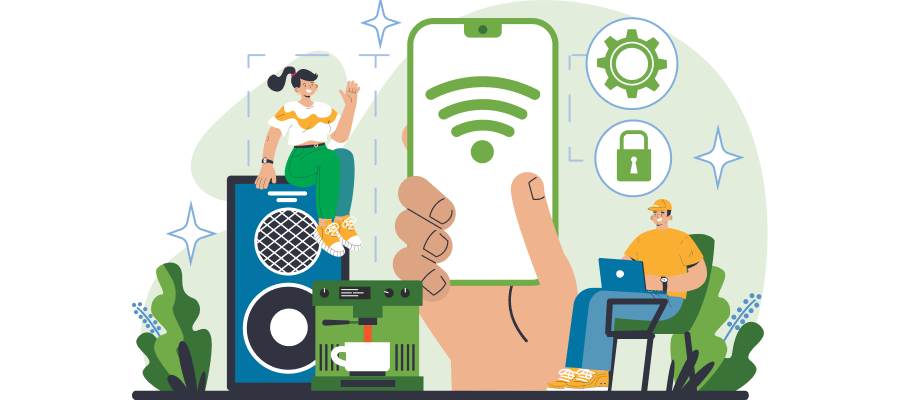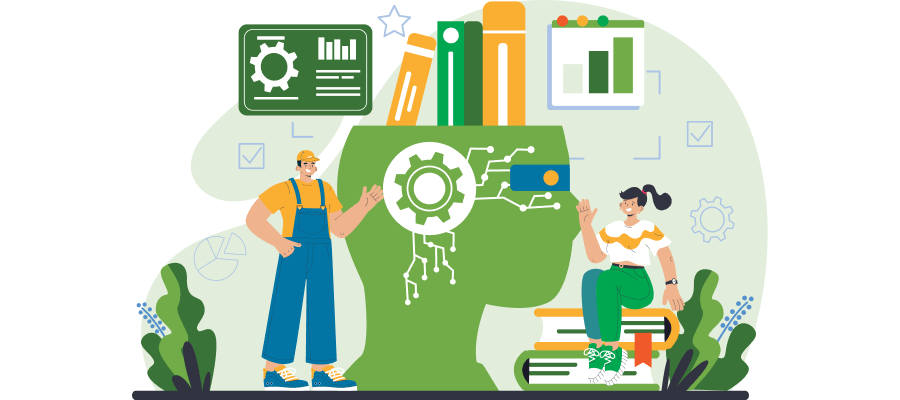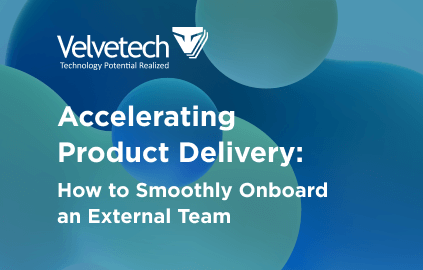As smart devices are increasingly spreading in our everyday lives, there is an unprecedented opportunity for businesses to shape this emerging market and create a demand for new products.
From pet trackers to medical sensors or multifunctional devices for monitoring the parameters of transported goods — all these connected devices generate event streams of data presented to end-users via mobile or web apps.
The combination of all these components — smart sensors, data aggregation, web & mobile apps, and the cloud infrastructure — forms the Internet of Things.
The development of IoT systems is a tricky business that implies being on the cutting edge of software & hardware implementation best practices. Therefore, it’s a solid strategy to get experienced IoT consultants and a trustworthy smart devices development partner that you can rely on when needed.
Lack of Developers
Find out how to deal with the lack of IT talents without compromising project delivery.
How to Find and Choose an IoT Development Company?
Let’s say you have an IoT project coming up. The first step to getting it underway is to commit to a certain deadline and budget, right?
It may be complicated when you are understaffed or stretching too thin on other ongoing projects, or else — lack the necessary technical expertise. You know someone who has successfully worked with an outsource partner, but you also heard a lot of horror stories about off-site teams.
One thing you know is you need a qualified team of IoT software developers to get this project done, and the question that might come to your mind is how to hire them. So, you set off on the quest for a proper connected devices development partner.
Of course, you might already know how to approach your search: choose a set of basic requirements like the location of the IoT development company, developers’ experience, and the team size you need — all these will help you narrow down the options.
There are several basic steps to take and factors to consider while searching for an IoT software development team. Let’s look at them in detail.
Three Ways to Find an IoT Company

1. Conduct Market Research
That’s probably one of the most time-consuming parts of the process you need to put effort into. To find the most relevant software developers for your Internet of Things project, you should conduct thorough market research.
Use any available channels to look for a potential software vendor, and don’t limit yourself to recommendations received from your partners, colleagues, or acquaintances.
For example, you can use research and review platforms like Clutch.co or GoodFirms that provide essential information about IT companies so you can opt for the one that fits your project the most.
Study the portfolio and experience and pay attention to the industry expertise. Then you can compile a comprehensive list of IoT developers to hire and narrow it down according to your preferences and their qualifications.
2. Consider IoT-Related Events
This might not be the first thing that comes to your mind, but attending IoT-related events can be a game-changer. Among them are conferences, hackathons, and trade shows that provide a unique opportunity to connect with industry professionals and experts.
Engaging with a diverse group of IoT professionals, including designers, developers, and engineers, will help you establish the right connections and hire a team for your IoT project. As a bonus, these events often feature keynotes and sessions with insights into emerging tools and frameworks, highlighting candidates who are ahead of the curve.
3. Ask for Referrals & Recommendations
It can come as part of the market research, but at the same time, asking for recommendations and referrals rightfully deserves to be a standalone step. You see, this approach leverages the power of your existing network and can lead to high-quality candidates. Why?
Referrals from trusted colleagues, industry peers, or even current employees often yield candidates or firms that are pre-vetted for their skills and cultural fit. People in your network understand your company’s needs and can recommend teams that align with your requirements.
Factors to Consider When Choosing an IoT Development Firm

Technical Expertise
Let’s cover what skills and knowledge IoT programmers should have in order for you to hire them without any concerns. Since there’s always more than one person working on the project, you should consider involving various specialists with expertise and knowledge that fit your endeavor.
Almost any team will include business analysts, project managers, designers, developers, and QA specialists. Yet, the most important roles to hire when implementing your IoT product will be hardware & software engineers and cloud developers.
Look for software developers with knowledge of technologies specific to the IoT ground. Even if every project differs and involves a unique approach, you can still focus on a certain tech stack that most IoT solutions have. Further on, we’ll touch on this moment in detail.
For now, let’s highlight the most common areas to pay attention to if you need to deliver a project that comprises the world of connected devices and apps. Specifically, your future IoT development team should have knowledge in the following areas:
- Hardware engineering
- Connectivity technologies
- Mobile app development
- Security practices
- UI/UX design
- Data analysis and business intelligence
- AI and ML tools
On top of that, every team member should have good communication skills to keep everyone on the same page while working on the project. Check for practices and methodologies they use to track the process, gather and share information, and manage the tasks.
Expanding a Team
Watch our webinar to unveil the tricks of onboarding a tech partner and incorporating it into the process to foster your product delivery.
Company Portfolio
We’ve already touched on this in one of the previous parts, however, the company’s portfolio is of utmost importance, so we’d like to focus more on it. It offers a comprehensive view of the team’s past projects, showcasing their experience, capabilities, and areas of expertise. Thus, considering it is an excellent way to find the team that matches your needs perfectly.
A robust portfolio should indicate a team’s ability to handle various types of IoT projects. Assess the complexity and scale of the solutions delivered. This will help you determine if the team has experience with projects similar in scope and complexity to your requirements.
Specifically, look for case studies or detailed descriptions of successful projects, especially those that feature unique or novel solutions. It can be a good indicator of a team’s creativity and innovation. And IoT projects often require out-of-the-box thinking to solve complex problems.
Customer Feedback
Customer feedback is another vital factor to take into account. In fact, client testimonials and reviews provide insights into the team’s overall reliability, performance, and expertise. All these factors help ensure you hire the best IoT developers capable of delivering a successful IoT solution.
Thus, read client testimonials on the company’s website or third-party review platforms that we mentioned earlier. Try to spot the patterns in the feedback to identify strengths and potential weaknesses.
Plus, if the company has repeat clients, this is a strong indicator of a team’s reliability and quality of work. In the end, clients returning for additional projects suggest that the team builds lasting relationships and consistently delivers value.
Making the Ultimate Decision
As you may guess, a final part of the selection process would be meeting with every company that drove your interest. At this step, you’ll find out the development costs, evaluate the proposals, and compare different vendors.
On the one hand, you need to prepare all the details related to your IoT project to share them with a team you might hire.In this case, you’ll be able to estimate if the software development company can address your goals.
However, before making your final decision, you should also discover as much as possible about the developers and the company itself. So, here’s a comprehensive list of questions you need to ask your candidates to pick the right IoT software developer.

The Essential List of Questions to Your Future IoT Developer
1. What Is Your Experience with the Development of IoT Projects?
The right partner will obviously demonstrate some case studies where they have helped businesses develop IoT platforms distributed between cloud services and on-premises gateways or devices. A vendor that has smoothly deployed IoT projects in your industry definitely makes up for a great development partner.
Anyway, it’s a rare case when a single vendor has implemented IoT projects across all verticals, like automotive, transportation, healthcare, or retail. However, an architectural approach and best practices successfully realized in one area can be effectively applied to other industries.
“The basic idea of the IoT is that virtually every physical thing in this world can also become a computer that is connected to the Internet.”
Your candidates need to be versed in different aspects of software development. As we’ve already mentioned, any IoT project encompasses various areas of expertise: from mobile app development to cloud services and protocols optimization, or big data management.
Yet, another layer of competency you are looking for in a potential IoT application developer to hire is their ability to work with third-party systems through APIs that must be integrated with an IoT solution.
It makes sense to inquire if the company is backing up the development of these real-time systems with the relevant software stack. A good example of solid tech expertise would be such programming languages as Erlang or Elixir.
Erlang is a general-purpose functional programming language available on all major OSes with lightweight processes and automatic garbage collection. It makes up for a great platform for developing distributed software systems. Of course, the range of programming languages and corresponding architecture is not limited to these variants.
Besides experience with the appropriate programming languages, a potential IoT software engineer should also demonstrate some core competencies:
- Equal mastery of all types of databases: SQL/NoSQL
- Implementation of various protocols: HTTP/MQTT
- Ability to ensure the security of systems with cryptography and certification
Just ask for their preferred software stack they lean on when developing IoT solutions.
2. Have You Implemented Any Real-Time IoT Systems in Our Sector?
Businesses may have various ideas for the realization of IoT solutions, but in general, they can be divided into two groups:
- Externally focused projects: manufacturing new, connected products for the consumer market
- Internally focused projects: retrofitting existing assets at an enterprise
These groups of IoT initiatives presuppose the use of various smart connected sensor devices and, therefore, require different expertise from your partner-to-be. It is a rare case when a vendor has successfully completed projects for both consumer and enterprise sectors.

At Velvetech, we are lucky to have worked in both sectors and helped our partners meet their business goals. As a result of our collaboration on the industrial IoT software platform and smart devices development, CargoData Corporation (Ventura, CA) has secured its superior position in providing industry-leading cold chain monitoring solutions.
Another case is when our partner entered the wearables market with a revolutionary personal security device that helps law enforcement officials and rescue teams carry on their duties.
3. What Is Your Expertise on the Hardware Side of the Internet of Things?
Knowing if your potential partner can design required hardware components on their own, for instance, layouts for the PCB boards — is going to greatly influence your IoT project. Principally, it clears up whether you will need some additional partners to design IoT devices and sensors.
Do go into detail and find out the specifics of their experience with hardware engineering:
- Knowledge of ARM Cortex, TI-based, and other microprocessors, chipsets
- Digital signal processors and controllers
- Low latency and Ultra-High Speed FPGA-Based Design
- RF and microwave circuit design
- RFID, NFC system design
- Mesh networking
- Low-power system design
- Integration with IoT cloud platforms
- ntegration with iOS, Android, MFi Program
It may be the case, as with Velvetech, that a vendor keeps close contact with several hardware manufacturers. Thus, it’s simple to order certain items by providing circuit designs and schematics and then verify the produced hardware.
Velvetech partners with a couple of trusted manufacturers that have proved on several occasions their ability to produce the required hardware equipment on time and according to our bill of materials.
It adds value to an IoT development company when it has experience going through a certification process required by some regulating companies. For example, mobile network operators like AT&T, Verizon, or Apple call for a certain certification when designing the hardware integrated with their products and services.
Another important area of expertise that instantly makes a potential vendor a keeper is the research & analysis capabilities of hardware design patents.
If your IoT project includes endpoints that need to be built from scratch, you definitely should look for someone who can research the prior art and look into the existing patents. This way your newly designed system and sensors will not infringe any third-party patents.
Finally, always ask for more examples of successful implementation of smart-device related projects. At Velvetech, we have two noteworthy use cases when our hardware expertise allowed our partner to get the edge advantage with their IoT development initiatives.
One is when we were able to design an RF-enabled sensor that was 3 times cheaper to produce than the standard off-the-shelf sensors with a radio frequency transmission capability.
Another use case involved the optimization of firmware for the specific BLE devices that resulted in a 15% power consumption reduction during the active communication stage between the BLE devices and smartphones.
4. How Competent Is Your Team in Terms of UI/UX?
Current IoT platforms, especially consumer-oriented ones, can hardly be imagined without a modern and user-friendly interface designed with best practices in mind.
Of course, many software development companies possess certain expertise in developing web and mobile apps with trendy and intuitive UI. However, you will be surprised to learn that there are plenty of system integrators who focus solely on architecture, server infrastructure, and firmware development.
Clarifying this moment up front can save you considerable effort at the later stages of the IoT solution development when the user-facing functionality needs to be produced.
5. Do You Follow Any Best Practices or Protocols to Streamline Your Production?
One aspect of selecting a vendor that requires your special attention is definitely examining their operation processes, like their time to engage, project knowledge handling, etc.
While IoT platforms are usually large-scale projects involving significant LOE for implementation, it just happens that employees rotate on such projects. It is of vital importance to discover if a vendor has a secure knowledge retention process in place.
A reliable partner would show you a robust system often based on a well-established software solution, like Confluence by Atlassian which we use at Velvetech, or similar tools.
To ensure a steady development pace, your candidates should be familiar with the best practices of software engineering. An experienced IoT development vendor applies test-driven development techniques and adheres to the continuous integration methodology.
The point is that isolated changes are immediately tested and reported on as they are added to a larger codebase. We call it a “continuous build” at Velvetech.
Response time, communication skills, and cultural background awareness are some other key factors to look at besides the development capabilities when evaluating potential IoT developers to hire.
- Do they have a strict policy on response time?
- Do they know enough about your culture and business to speak the same language?
- Do they keep communication flows noise-free and approach expected issues proactively?
All of this will become a substantial part of your engagement with a partner vendor for years to come. So, it makes a lot of sense to dive deeper into these areas of their proficiency.
Last but not least is the company’s ability to assist you at the discovery stage when the project is imminent, and rapid prototyping, business analysis, or a quick R&D investigation can really make a difference. For example, Velvetech has a policy of 3-day proof-of-concept availability, meaning we can provide the first PoC within 3 business days upon request.
“There will be more than 29 billion IoT connections by 2027, beating the current number of 14 billion active endpoints”
Source: IoT Analytics GmbH
6. What Is Your Typical Rate?
The rewarding point in this tedious selection process is when you shortlist candidates according to the above criteria and start asking about their price tags. It goes without saying that receiving a blended rate provides little understanding of the budget options for your particular project.
This is why it is a good idea to provide a partner-to-be with a detailed Request for Quote or at least some high-level requirements. Such documents guarantee that you are requesting the same thing from all of the IoT developers you think to hire and reduce the risk of receiving apples-to-oranges proposals.
Look for the word “flexible” in their answers as experienced vendors know too well that projects vary by length, level of required expertise, deadlines, etc. All of these factors ultimately influence the overall budget.
Velvetech is both flexible and reasonable when assessing the financials of the IoT project development. Get in touch for a free consultation. Our seasoned IoT software engineers and developers will be happy to guide you through the IoT development process and see your connected devices solution make a change in the market.











